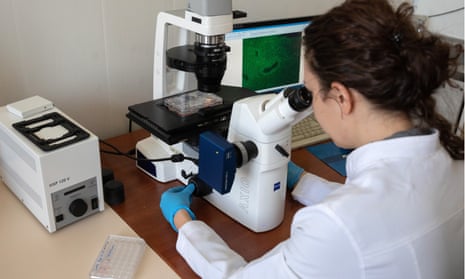It threatened to be a calamitous year for those affected by Britain’s most widespread inherited illness, cystic fibrosis. The disease attacks patients’ lungs, leaving them dangerously susceptible to airborne infections. The appearance of Covid-19 – which can cause deadly lung disease and pneumonia in healthy individuals – triggered serious alarm among doctors, carers and patients.
“We were really worried that this previously unknown virus could be particularly bad news for people with cystic fibrosis,” said Keith Brownlee, a director at the Cystic Fibrosis Trust. “We thought this could be very dangerous.”
Yet 2020 has not turned out to be the disastrous year for cystic fibrosis patients that had been anticipated. They have proved to be largely resilient to the threat of Covid-19 infections while the release of a new class of treatments for the condition has made remarkable improvements to the lives of many of the 10,600 people in Britain who have the disease.
“I started taking one of the new drugs – called Kaftrio – earlier this year,” Michael Winehouse, a cystic fibrosis patient, told the Observer. “Within a day I felt better. Since then, my lung function has increased, my weight has returned to normal, I am better able to fight off infection, my energy levels have rocketed and I have less need of antibiotic treatments.”
Cystic fibrosis is caused by a mutant gene that interferes with the body’s ability to move chloride molecules. Individuals who carry a single copy of this gene are unaffected but those who inherit two copies – one from their father, one from their mother – are affected. Their cells cannot produce healthy digestive juices, sweat or mucus. Lungs clog up and become infected.
“Together these genes mean that the functioning of chloride channels in the lungs is disrupted,” added Brownlee. “The crucial point about the new drug is that it can restore some of that functioning. Everything stems from that.”
Winehouse, a charity fundraiser from Epping, agreed. “It has had a wonderful impact on my life,” he added.
Given the grim prognosis for cystic fibrosis patients that was being forecast at the beginning of the Covid-19 pandemic, this has certainly been a remarkable transformation in fortunes for many patients.
“The other factor that has worked in our favour is that we already knew how to isolate ourselves effectively,” added Winehouse. “We are very susceptible to infections. If there is a family party being held, I have to check if anyone who is going to be there has a cold or a cough. If they do, I cannot attend. We have spent our lives becoming trained in the arts of shielding ourselves.”
In the past, people with cystic fibrosis would die in childhood. The development of antibiotics has helped to keep them alive, but even today few live beyond their 40s and only survive by going through long daily physiotherapy sessions, the consumption of dozens of vitamin and digestive enzyme tablets, and the constant use of antibiotics and asthma inhalers.
“I am 34 and was beginning to look at the next decade with some apprehension,” said Winehouse. “Now the drug has changed that, I can look to the future with a bit more confidence.”
Not every patient responds to the new drug, which is still being rolled out by doctors, and some are still ineligible to get it.
“At the moment, patients under the age of 12 cannot get the drug but we are confident that will change very soon. It has actually been a fantastic year in some respects for patients,” added Brownlee.
